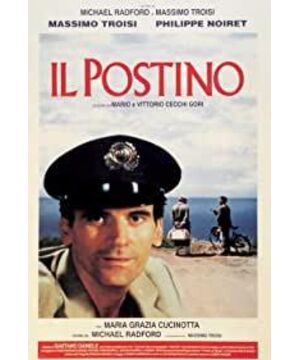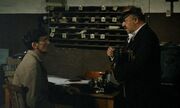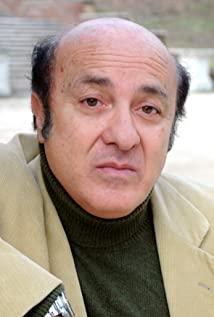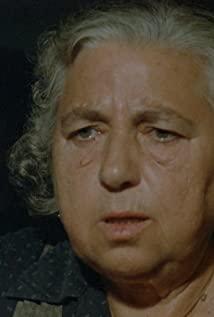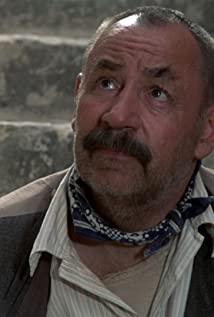In 1952, the Italian island welcomed two guests from afar - the poet and political activist Neruda from Chile, and his lover Mathilde. At the same time, it also welcomed a flood of letters from all corners of the world. Mario, the son of a local fisherman, was fortunate to get a temporary job as a postman, and he developed a deep friendship with the poet in his interactions with him. Mario fell in love with the hotel girl Bess, because of love, he entered the realm of poetry, because of poetry, he won the heart of the person he loves.
The delicate sea breeze accompanies the clumsy bicycle, and on the gravel-paved path, a dull young man simply goes back and forth, chasing.
Poetry entered the heart of a simple young man and opened another world for him.
On the beach in the early morning, the poet taught the youth how to write poetry. As Neruda said in the film, "The world is a metaphor." This is the world in the eyes of a poet. The things in the world are presented to the poet in different ways, whether simple, rich, joyful, or sad. The poet experiences the different tastes of everything with his sensitive heart. He experiences the world with the eyes of a poet and integrates the world into the poems. Metaphor is a shelving. Poets put it there and let the different gestures and connotations of various concrete things naturally make a glass of rich wine. In the kingdom of language, it is full of flavor and timeless juice, exuding a unique and blurred aroma. When Mario understood all this, he was given a pair of sharper eyes, and the world in his eyes changed. When the fishing net becomes "sad", when Bi Si's face turns into a "flying butterfly" and emerges, he also becomes a poet.
Love makes Mario sick, and he wants to stay sick. Indulging in the world of love is like indulging in the poetic world, it is painful and unbearable to leave. At this moment, Bess has also become a poet. She and Mario are like Mario and Neruda. I even wonder if she fell in love with Mario or poetry, or a feeling of love, a poetic world. The puffed-up hotel girl who was mixed in with the rough and drunk turned into a gentle and sentimental woman. Love and poetry unleashed the most sensitive and delicate femininity in her.
"Readers teach poets how to start writing poems, and poets teach readers how to read poems." As Chen Jiaying said, readers are the hidden motivation of poets to write poems, and they are hidden behind the author. The poet is the reader's concern and emotion opener. Mario inspired Neruda, and Neruda taught Mario how to see the world.
When facing the microphone of the recording equipment for the first time, Mario did not know how to describe the beauty of this island, and poetry taught him what beauty is. When the poet was gone, he turned back into the microphone and recorded the waves there, light and rough, the wind from the cliffs and the bushes, and the heartbeat of his unborn baby...
sadly, Mario Accidentally died while reading a poem. This little black box, which recorded the beauty of the island, became the only memory of his wife to him and to Neruda.
Poetry is the clue of the film, the content of the film is also the taste of the film.
Love is the same.
The poet not only taught Mario how to write poetry, but also how to love.
Neruda was exiled from his own country, but he didn't just belong there, the whole world was his home. His mind is free. The great poet, the outspoken statesman who valued social justice as much as poetry, deeply loved nature, women, bread and wine, this world and its people. His broad mind and his fiery concern for all ordinary things made Mario deeply emotional, and gave him far more help than courtship. At the same time, the film reminds people of the great poet again, and also presents the sincere respect of the people of the world for him. It's just that memory is too fragile, and forgetting is so cruel. The poet returns to the island after many years, but everything of yesterday is gone.
The characters in the film all have a simple and real nature, and they are friendly and sensible. Just like that typical Italian town. Under the blue sky, the humble street and the ivory-colored house have a quiet dialogue; the clean wind carries the damp water vapor, allowing the green trees to breathe freely; the drunken man in the hotel complains rudely, and the proprietress keeps nagging and blending into a ball... …These are the unique scenery of the town, the real life of the people in the town. Bread and wine, sewers and elections, that's a life without enough food and drink, enough praise and scolding.
It is worth mentioning that the music of the film matches the rhythm of the film very well. The local special instrument bandone accordion, harmonica and violin are brought together to display the rural atmosphere of the island just right. Accompanied by Mario's bumpy bicycle, the main theme is melodious and melodious, and the rhythm is full of harmony. What flows out is not only music, but also a long line with time, slender and full of elasticity, swirling in people's hearts, intermittently and continuously, nourishing people's hearts. The audience also seemed to feel the sea breeze blowing, the stones sliding down the bicycle, and the intoxicating and annoying life.
There is also a piece of music from the Argentine tango "Madres-elva" (Mother Selva). In Mario's email, the poet's wife, Mathilde, found a stack of records, and she chose one to put on the record player. The vinyl records spun with a unique old-fashioned vibe, and the poet and his wife danced tango to the dance music. The unique charm of South America is unbridled, and it also brings the cultural charm of the poet's hometown.
The whole film is simple and pure, as pure as what it expresses. The linear narrative structure, the few characters, the untouched shots, everything is so natural and real. There are no fancy tricks, no obscure expressions, and watching a film like this is like an Adriatic sea breeze, leisurely and comfortable. Every picture is wrapped in fresh and elegant tones, and the director tells the story to the audience peacefully and kindly. There are no strong winds and waves, but it is meticulous, and it is simple and generous without being meticulously crafted. It is the sincerity of the film that allows us to see the subtle friendship between an ordinary young man and the poet, and to feel the charm of poetry and the beauty of love.
View more about The Postman reviews


